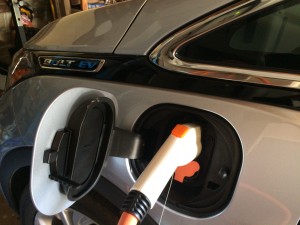 The Trump Administration has not given positive indications about the U.S. commitment to electric vehicles. Encouraging a transition from vehicles powered by petroleum fuels to locally generated electricity makes sense for air pollution, national security, and economic reasons, but the administration seems firmly committed to advancing the interests of the oil and gas industry instead.
The Trump Administration has not given positive indications about the U.S. commitment to electric vehicles. Encouraging a transition from vehicles powered by petroleum fuels to locally generated electricity makes sense for air pollution, national security, and economic reasons, but the administration seems firmly committed to advancing the interests of the oil and gas industry instead.
Some troubling signs:
- The administration wants to roll back some of the Obama-era fuel economy standards for vehicles, which help boost electric vehicle production.
- The administration may challenge in court past federal waivers granted to California under the Clean Air Act, which allow the state to pursue more stringent standards than those set at the federal level. That waiver authority is central to California’s sovereignty to issue rules like the ZEV (zero-emission vehicle) mandate, which requires automakers to produce a certain number of electric vehicles (or buy credits from those companies that do) per year.
- At the agency level, the administration has discontinued relatively low-lift but big impact programs that boost electric vehicles, like the “Workplace Charging Challenge” at the U.S. Department of Energy. I happened to be on that program’s mailing list, and I got an email on March 27, 2017 that noted the highlights of the program but then said the following:
I am pleased to share with you that DOE is celebrating the success of the Challenge and concluding the formal initiative this month.
But if the federal government continues to pull back support for these efforts and undercut EV-friendly states like California, all may not be lost. And the reason is that the U.S. is not the only game in town. India and China may quickly fill the void, as Reuters reported:
In its “road map”, released in April, China said it wants alternative fuel vehicles to account for at least one-fifth of the 35 million annual vehicle sales projected by 2025.
India is considering even more radical action, with an influential government think-tank drafting plans in support of electrifying all vehicles in the country by 2032, according to government and industry sources interviewed by Reuters late last week.
So has the electric vehicle market already left the garage, so to speak? With prices falling and big automakers committing billions of dollars on new EV models, the continued demand from developing countries like India and China could keep that investment going if the U.S. hits the pause button.
It’s a reassuring development, but also an indication of how the U.S. is at risk of abdicating its leadership — and market share — in this growing industry.


